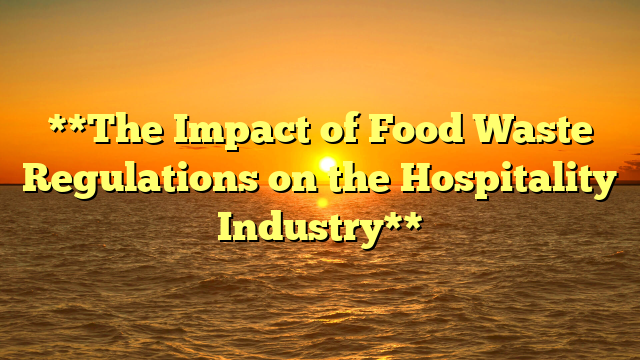
The hospitality industry, encompassing hotels, restaurants, and catering services, is one of the largest contributors to food waste globally. With millions of tons of food discarded annually, governments and organizations are increasingly implementing regulations to address this issue. These regulations aim to reduce food waste, promote sustainability, and minimize the environmental impact of the hospitality sector. While these measures are essential for a greener future, they also bring significant challenges and opportunities for businesses in the industry.
One of the primary impacts of food waste regulations on the hospitality industry is the need for operational changes. Many regulations require businesses to track and report their food waste, which can be a complex and resource-intensive process. For example, restaurants may need to invest in new software or systems to monitor inventory, track food usage, and identify areas where waste occurs. While this may initially increase operational costs, it also encourages businesses to adopt more efficient practices, such as better portion control, improved storage methods, and optimized menu planning.
Another significant impact is the push toward food donation and redistribution. Regulations in many countries now incentivize or mandate businesses to donate surplus food to charities or food banks rather than discarding it. For instance, France passed a law in 2016 prohibiting supermarkets from throwing away edible food, requiring them to donate it instead. Similar regulations are being considered or implemented in other regions. While this reduces food waste and supports vulnerable communities, it also requires businesses to establish partnerships with local organizations and ensure proper handling and transportation of donated food.
Food waste regulations also encourage innovation within the hospitality industry. To comply with new rules and reduce waste, businesses are exploring creative solutions such as composting, anaerobic digestion, and upcycling food scraps. For example, some restaurants are turning food waste into biofuels or using it to create new menu items, such as soups or sauces made from vegetable peels and trimmings. These innovations not only help businesses meet regulatory requirements but also enhance their sustainability credentials, which can attract environmentally conscious customers.
However, the implementation of food waste regulations is not without challenges. Smaller businesses, in particular, may struggle with the financial and logistical burden of compliance. Investing in new technologies, training staff, and redesigning processes can be costly, especially for independent restaurants or family-owned hotels. Governments must consider providing support, such as grants, subsidies, or tax incentives, to help smaller businesses adapt to these changes.
Additionally, food waste regulations can influence consumer behavior and expectations. As NS2121 – Situs Judi Online Terbaik of food waste grows, customers are increasingly demanding that businesses demonstrate their commitment to sustainability. Hospitality businesses that proactively address food waste can differentiate themselves in a competitive market and build stronger relationships with their customers. On the other hand, businesses that fail to comply with regulations or show a lack of effort in reducing waste may face reputational damage and loss of customer trust.
In conclusion, food waste regulations are reshaping the hospitality industry by driving operational changes, promoting food donation, and fostering innovation. While these regulations present challenges, particularly for smaller businesses, they also offer opportunities to improve efficiency, reduce costs, and enhance sustainability. By embracing these changes, the hospitality industry can play a crucial role in addressing the global food waste crisis and contributing to a more sustainable future. Governments, businesses, and consumers must work together to ensure that these regulations are implemented effectively and equitably, creating a positive impact for both the environment and the industry.




